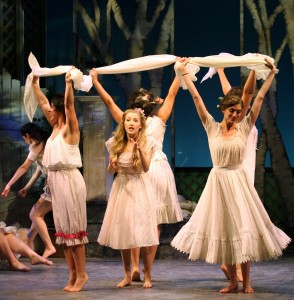The Golden Bride ("Di Goldene Kale"), a joyful operetta from 1923 performed on the compact stage at the Museum of Jewish Heritage by the National Yiddish Theatre Folksbiene, is set in a small Russian village and begins with a tongue-in-cheek song about money. In Yiddish with English and Russian supertitles, the cast sings “Oi, Oi, The Dollar” when Goldele, a young woman who has been raised by another family learns that her father, who moved to America when she was a child, has died and left her a fortune. Thus begins a tale that folds real-world politics (the metamorphosing face of Russia, immigration and the pursuit of money in America) into a fairytale of love and marriage.
Goldele, buoyantly played by Rachel Policar, loves Misha, the son of the family she has grown up with. Misha is handsome and honorable. They claim their loves goes back to childhood but we can also see why she loves him: Cameron Johnson's Misha is reminiscent of a young Leonardo DiCaprio with his movie star good looks and understated seriousness. Goldele's Uncle Benjamin (played by Bob Ader), however, wants her to move to America and marry his American-born son Jerome. Expertly played by Glenn Seven Allen, Jerome is the opposite of Misha: he is square-jawed and jaunty and speaks of baseball and jazz. Jerome is not interested in Goldele anyway: after a few weeks in the Russian village, he's fallen in love with Khanele played by the wonderful Jillian Gottlieb, who is physically and vocally light as a feather.
The story has many elements of a Shakespearean comedy: a young girl grows up without her mother, but when her father dies and leaves her a fortune, she wants to find her mother. Goldele's urge to find her mother is so strong that she declares to Misha and all the other suitors in the village that she will marry anyone who can can find her mother.
In Act II, everyone comes to America including Goldele's surrogate mother, father, Khanale, and Pinchas, the village matchmaker. Bruce Rebold, wonderfully comic as Pinchas, brings out the central role of the matchmaker's role in Jewish culture (think Fiddler on the Roof and the song "Matchmaker, Matchmaker"). Pinchas hasn't lost any time once he gets to America and offers suitors to the maids who work for Goldele's uncle. They all seem promising enough, but then we learn they have a fault or two. One is rich but blind. Another is kind but missing a leg. And one is tall and handsome but works two jobs: as a window washer and as a waiter at Yonah Schimmel's, the famous knish place still standing on Houston Street.
Although Goldele doesn't need a matchmaker, she may need a shrink. Why does she offer her hand to any suitor who can find her mother when Misha is clearly the best candidate? The others: a deaf shoemaker, a roly-poly cantor, and a tailor, are bumbling and seemingly inept. They are definitely no match for the handsome and worldly Misha. But the primal draw to find her mother is understandable. Perhaps knowing our parents completes us.
Everyone quickly adapts to the rich life in America and play tennis, drink cocktails at tea time and buy new clothing. They continue to speak Yiddish once in the new country, but Goldele's (surrogate) mother, Toybe (played by Lisa Fishman) likes to try out her English. When she shows her husband, Pinchas, a new dress, she asks: “How do you like she?” His response: “You look like a delicious beef roast,” is all the funnier because it hits home the personal or familiar struggle with English as a foreign language. Then he asks: "Why are we speaking English?"
The Golden Bride touches upon some of the basic struggles that immigrants have and the question of why people leave their homeland. The reality of history looms behind the family. In 1923, when the play was written, the changing political climate after the Russian Revolution of 1917, as well as World War I (which ended in 1919), would result in poverty, famine and persecution for many. The family is aware that America is a hopeful place even to them who are lucky enough to enter into a life of wealth and ease.
Beautifully rendered sets by John Dinning are highlighted in the final act when the family gathers for a masquerade party. Finishing in true Shakespearean form, a masked stranger appears who brings news to Goldele about Misha and about her mother. But who is this man? And why does he know so much? Although we know, it’s impossible not to feel like cheering when the truth is revealed to Goldele as well.
The cast is superb and their infinite vocal talent is allowed to shine under the aegis of conductor and musical director Zalmen Mlotek with choreography and musical staging by Merete Muenter. The full-bodied singing and dancing accompanied by a live orchestra in The Golden Bride is an especially rare treat in Off-Broadway theater today.
The Golden Bride runs until Jan. 3 in the Edmond J. Safra Hall at the Museum of Jewish Heritage (36 Battery Place between 1st Place and Little West St.) in Manhattan. Check the Museum of Jewish Heritage for the full performance schedule. For tickets, call OvationTix at 866-811-4111 or visit the website.



